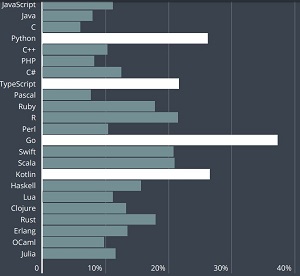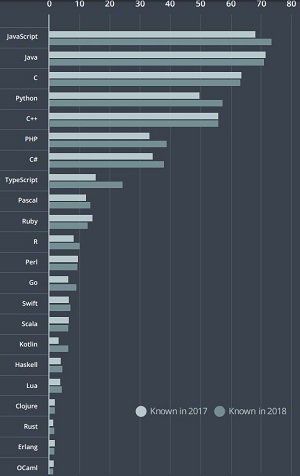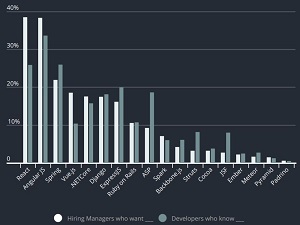News
Skills Survey: Developers Want to Learn Go, Kotlin and Python in 2019
- By David Ramel
- January 29, 2019
One way of ranking programming language "hotness" is to ask developers what languages they want to learn, which HackerRank just did, finding Go, Kotlin and Python topping the list.
"Developers are as eager as they were last year to learn Go, Kotlin, and Python in 2019," the firm said in announcing the results of its annual
Developer Skills Report based on a survey of more than 71,000 developers in the company's community. The technical recruiting firm emphasizes skills measurement to match up coders with employers, rather than credentials or pedigree.
"Interestingly, developers' interest in Scala has dropped, whereas their interest in TypeScript has increased," the report continued. "Scala was the 3rd most popular language that developers planned to learn in 2018 but dropped to 6th place in 2019."
That want-to-learn list seems to show a slow changing of the guard, as those upstarts listed above differ from the most-popular list still dominated by veteran offerings such as Java, JavaScript and C-family options, though Python lives in both camps.
 [Click on image for larger view.]
Languages Developers Want to Learn in 2019 (source: HackerRank)
[Click on image for larger view.]
Languages Developers Want to Learn in 2019 (source: HackerRank)
Speaking of the most popular languages, the firm noted the report's 2018-based data differs from 2017 data in that JavaScript overtook Java as language the largest plurality of respondents identified as knowing.
 [Click on image for larger view.]
Languages Known in 2017 vs. 2018
(source: HackerRank)
[Click on image for larger view.]
Languages Known in 2017 vs. 2018
(source: HackerRank)
"When comparing the most popular languages that developers were learning year over year, we found that developers were learning JavaScript at the most rapid rate," the report said. "In 2018, 73 percent of developers said they knew JavaScript, up from 66 percent in 2017. This also makes JavaScript 2018's most well-known language, compared to Java in 2017."
The report could also serve to guide employers seeking to bolster their developer ranks with hard-to-find talent amid a chronic skills shortage coinciding with increased demand for business apps. For example, the survey asked developers what they liked and what they disliked about employers and jobs.
The most important factor in evaluating a potential job is "professional growth and work-life balance," with "competitive compensation" No. 2 and "competitive compensation" in third place (respondent percentages differed among junior and senior developers, but those three topped both lists).
"Developers are voracious learners by nature and necessity, given tech's rapidly changing pace," HackerRank said. "The importance of work-life balance for both senior and junior is aligned with studies which have found that employees who do significant amounts of overtime are at a large risk of burnout, leading to a decrease in productivity, high turnover, and even health concerns."
The No. 1 way to lose developer candidates, the report said, is to not provide clear roles, with some 68 percent of respondents listing the primary empolyer turn-off as "Not enough clarity on role or where I'll be placed."
"A poor interview experience is a surefire way to lose top candidates in today's competitive tech talent market," the report said. "Developers were most likely to be turned off by employers who don't provide enough clarity around roles or where they'll be placed. 49 percent said lack of values alignment was a turn-off and 14 percent reported not enough diversity on the panel was a deal-breaker."
Other report highlights include:
- There's a slight disconnect between frameworks that developers want to learn and frameworks employers want their developers to know. Despite developers taking a stronger interest in React, companies' appetite for this front-end framework outpaced the number of developers who knew React in 2018.
 [Click on image for larger view.]
Frameworks Hiring Managers Want vs. Frameworks Developers Know
(source: HackerRank)
[Click on image for larger view.]
Frameworks Hiring Managers Want vs. Frameworks Developers Know
(source: HackerRank)
- Developers believe that blockchain is overhyped. 20 percent say we won't see real-world application of the tech within the next two years.
- Most Gen Z and Millennial developers say that their first coding project was a calculator, whereas their Gen X and Baby Boomer counterparts were most likely to create a game as their first attempt at programming.
- While AngularJS maintained its spot as the most popular framework year-over-year, React is being learned at the fastest rate.
- Dance and electronic music fuel coding sessions. Developers who listen to music while working were most likely to turn to dance and electronic music to help them get into the flow of coding. Developers who are 21 years old or younger were more likely than any other age group to listen to hip-hop and rap while working.
- The No. 1 pet peeve is badly written documentation. "Developers' struggles are real ... and we wanted to find out what frustrated them the most. Junior developers particularly despised badly written documentation while senior developers thought spaghetti code was the worst."
- One of the biggest bugs is "Wiped out database." When asked about their biggest bug in production, deploying untested or broken code was the most common response. "We also found that ~10 percent of developers admitted to wiping out the entire database."
- 58 percent of developers took action in response to concerns about employers. 2018 was the year of taking action -- from employee walkouts to company boycotts. In fact, 58 percent of developers polled took action in response to concerns about their company. Examples of concerns included affiliations with privacy misuse and censorship. Close to 40 percent of developers approached their leadership about their concerns regarding their company. 23 percent quit their job or began looking for another position in response to misgivings.
A total of 71,281 professional and student developers from more than 100 countries took the online survey from Nov. 5 to Nov. 27, 2018, the company said. The survey was hosted by SurveyMonkey, and HackerRank recruited respondents via e-mail from its community of more than 5 million members and via social media sites.
About the Author
David Ramel is an editor and writer at Converge 360.